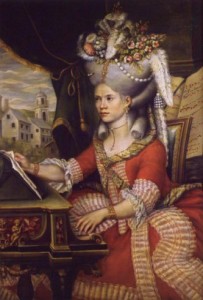 Relevant History welcomes back historical mystery author Beverle Graves Myers, who combines a love of Italy, opera, and traditionally written mysteries in her Tito Amato novels featuring an 18th-century singer-sleuth. The latest title is Whispers of Vivaldi. Bev also writes short fiction that has appeared in Alfred Hitchcock Mystery Magazine, Spinetingler, and Crime City Central (audio). Her work has earned nominations for the Macavity, Kentucky Literary, and Derringer awards. Bev and husband Lawrence have recently relocated to south Florida. For more information, check her web site, and look for her on Facebook, Twitter, and Goodreads.
Relevant History welcomes back historical mystery author Beverle Graves Myers, who combines a love of Italy, opera, and traditionally written mysteries in her Tito Amato novels featuring an 18th-century singer-sleuth. The latest title is Whispers of Vivaldi. Bev also writes short fiction that has appeared in Alfred Hitchcock Mystery Magazine, Spinetingler, and Crime City Central (audio). Her work has earned nominations for the Macavity, Kentucky Literary, and Derringer awards. Bev and husband Lawrence have recently relocated to south Florida. For more information, check her web site, and look for her on Facebook, Twitter, and Goodreads.
*****
 A portrait hangs in a dusty corner of the La Scala opera house in Milan. A woman in an 18th-century gown and towering, flower-bedecked wig sits at a harpsichord, staring into space. She appears distant, sullen, and not entirely comfortable in her elaborate dress. Known as Teresa Lanti, she was an accomplished soprano and the mistress, for a time, of the even more famous Giacomo Casanova.
A portrait hangs in a dusty corner of the La Scala opera house in Milan. A woman in an 18th-century gown and towering, flower-bedecked wig sits at a harpsichord, staring into space. She appears distant, sullen, and not entirely comfortable in her elaborate dress. Known as Teresa Lanti, she was an accomplished soprano and the mistress, for a time, of the even more famous Giacomo Casanova.
I introduce you to Teresa Lanti because this pensive-looking woman inspired a character that came to mystify Tito Amato more than any other. Who was she really?
First a little about Casanova. The man whose name has come to define womanizing was a real person, actually a Venetian of Tito’s era. He was born in 1725, the first child of Zanetta Farussi, a comic actress who went by the stage name of La Buranella, and an actor-dancer named Gaetano Casanova. Or perhaps that’s only part of the truth. Casanova often claimed Venetian aristocrat Michele Grimani as his father, but where Casanova is concerned, truth is a slippery concept. History does record that young Giacomo refused to go along with his parents’ plan to make him a priest and was expelled from a seminary for immoral conduct. He proceeded to scheme his way through Europe, romancing a dazzling array of women (and several men) and running afoul of authorities at every turn. Though Casanova is famed for being a self-styled great lover, he was also a cabalist, spy, soldier, violinist, lottery administrator, and more. Near the end of his long life, he finally settled down to write a highly entertaining twelve-volume autobiography, which I often mine for eighteenth-century background and characters.
Which brings us to Teresa Lanti, one of Casanova’s more peculiar conquests. In Volume Two of his autobiography, our lovable rogue tells the tale of his compelling attraction to Bellino, a teenaged castrato traveling with his theatrical family. Castrato? Yes! If you’re unfamiliar with 18th-century fads, Europe had gone mad for Italian opera and its star singers. The castrati were men who had been gelded as pre-pubescent boys and were revered for their golden voices that held an uncanny combination of pitch and power. The effect was ethereal and haunting, causing women to swoon and bringing tears to hard men’s eyes—but I digress. When Casanova encountered Bellino at an inn in Ancona, he could scarcely believe that the beautiful creature was male, even though Bellino himself swore it was the truth. So intrigued was Casanova that he tried every trick of seduction to induce the singer to share his bed, even offering the boy’s mother a gold doubloon to view his genitals.
To make a long story short, Casanova eventually invaded Bellino’s breeches and discovered a false penis. He describes it thusly, “long, limp and as thick as one’s thumb, pale, and of very soft leather.” Bellino was indeed a female. Salimbeni, a valid castrato singer, had been her music master and helped develop her fine soprano voice. She blamed her unfortunate situation on her mother’s scheming. Two issues stood behind the disguise. As theaters within the Pope’s political domain banned females from the stage, castrati sang the prima donna roles in Rome and other cities within the Papal States, including Ancona where Casanova met Bellino. In Venice and other, more progressive musical centers, women took their rightful place as prima donna, but they were paid in woeful contrast to the reigning star castrati. Posing as a man, Bellino would have more opportunity to perform and earn a higher salary while doing so.
Casanova recounts that his affair with Teresa, who was sometimes called Angiola on opera bills, was fraught with uncertainty on his part. However, it lasted long enough for her to become pregnant with his son, Cesarino Lanti, whom she went on to raise as her brother. Eventually the couple parted. Casanova sent Teresa to Naples, stating that he could not bring himself to deny her the career she deserved, and he continued on his all-too-merry way. Teresa married Cirello Palesi, a young Roman, and traveled Italy singing prima donna roles in major opera houses. A few years later Teresa and Casanova met one more time, but the magic was gone.
And, at some point, she had her portrait painted.
Highly intrigued by Teresa’s story, I was determined to include a gender-bending character in Whispers of Vivaldi. In this final Tito Amato mystery, set in the dazzling, decadent world of baroque Venice, Tito spars with Angeletto, a young male soprano who has taken Milan by storm. Tito is depending on his star power to save the opera house from ruin, but is the heavenly singer all that he appears to be? Whispered rumors quickly fly through the taverns and coffee houses of Venice. Angeletto is too lovely to be a man—shouldn’t he be wearing skirts instead of breeches? Tito begins to suspect that he’s been tricked by a daring female impersonating a castrato. If the rumors are true, not only will Tito become the chief laughingstock of Venice, but the Senate is apt to withdraw its sponsorship of the opera house altogether. Like Tito, the reader can never be certain just who this amazing singer really is.
If you think this all sounds very Victor Victoria (the delicious 1982 musical comedy starring Julie Andrews) you’re not alone. I had to wonder if the screenwriters were familiar with Teresa Lanti, or, to repeat the old proverb, there’s really nothing new under the sun.
*****
 A big thanks to Beverle Graves Myers. She’ll give away a signed hardcover copy of Whispers of Vivaldi to someone who contributes a comment on my blog this week. I’ll choose the winner from among those who comment by Saturday at 6 p.m. ET. Delivery is available within the continental United States only.
A big thanks to Beverle Graves Myers. She’ll give away a signed hardcover copy of Whispers of Vivaldi to someone who contributes a comment on my blog this week. I’ll choose the winner from among those who comment by Saturday at 6 p.m. ET. Delivery is available within the continental United States only.
**********
Did you like what you read? Learn about downloads, discounts, and special offers from Relevant History authors and Suzanne Adair. Subscribe to Suzanne’s free newsletter.
